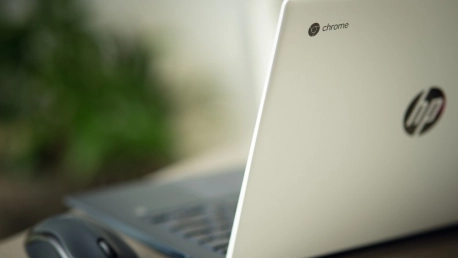If you are in the market for new laptops for your team, Chromebooks are one of the options you should consider. This type of business laptop is launched under the Google umbrella, in collaboration with well-known laptop manufacturers.
However, with Chromebook you’ll also be switching to a new operating system. Should you say goodbye to Windows or macOS? Well, that depends. In this article, we’ll explain what ChromeOS is, how it works, and what it is designed for, so you can decide if it’s a good option for you and your company.
What Is ChromeOS?
ChromeOS is an easy-to-use and secure Linux-based operating system developed by Google for its Chromebook line of laptops. These computers are specifically designed to run applications from the Google ecosystem. Basically, switching to ChromeOS means that every employee will use a Google account to open the laptop, store data, and be constantly connected to all Google services and apps.
ChromeOS doesn’t require additional anti-virus software and is integrated with all Google services. Employees can only install and use apps from the Google Play Store and Google Workspace Suite. They can organize files on Google Drive, write texts and presentations with Google Docs, Sheets, and Slides, stay in touch with the whole team via Chat and Meet, or continue creative projects with editing programs.
How Does ChromeOS Work?
ChromeOS is an operating system that is synchronized with Google’s cloud services. While other traditional operating systems require hard drive storage and some knowledge for installation and maintenance, this is not the case with ChromeOS, as the Chrome browser is the operating system itself.
ChromeOS is built around Google products. Therefore, not all programs are compatible with this operating system. Chromebooks could be an excellent choice if your employees mainly use laptops for productive, but simple tasks, like text processing, online meetings, or web browsing. For example, ChromeOS isn’t suitable for editing photos and videos or running resource-intensive software such as CAD solutions.
You can install software that is compatible with Linux, and there are even some workarounds to install Windows software on a Chromebook, but that will be the topic of a separate article.
What Are the Differences Between ChromeOS and Chromium OS?
Before you decide whether you should make the switch to Chromebooks, you need to learn the difference between ChromeOS and Chromium OS. Although they are products of the same family, the two don’t cover the same needs.
ChromeOS provides an ideal platform for a variety of stakeholders, including businesses, corporations, schools, non-governmental organizations, and app developers. ChromeOS is supported by the licenses required to run binary packages like Flash or PDFs on hardware from Acer, Samsung, Lenovo, and HP.
Chromium OS, on the other hand, is an open-source project. It is used primarily by developers, and its code can be viewed, modified, or used to develop apps by anyone. At its core, it is an open-source browser, created by Google, and from which various other products created by other companies can be derived.
Can ChromeOS Be Used Offline?
Although ChromeOS is a cloud-based operating system, you or your employees can perform many tasks using Chromebooks without an Internet connection. However, you need to prepare in advance for working offline in ChromeOS. Some key services require a cloud connection and prior settings for them to be functional offline. In fact, some tasks can be performed offline only by using third-party software components.
Among the services that can be used offline are: Gmail (you can search, read, and reply to emails even without a cloud connection); Google Keep (you can still take notes and check lists); Google Docs, Sheets, and Slides (you can view, create, and edit files using Google Drive).
Should You Consider ChromeOS?
Chromebooks have been around for more than 10 years, and they could be the ideal choice for a wide range of businesses. With ChromeOS, you don’t have to worry about complicated installation or configuration procedures, which reduces the workload of your IT team. With a single Google account, one can sign in on a ChromeOS-equipped laptop and have access to services like Maps, Docs, or Drive. One just logs in and gets to work, without any need for separate accounts and passwords.
Still not sure if a Chromebook with ChromeOS is the right choice for you? Make a list of all the apps your employees use on their computers. If they are all accessible through a web browser, then ChromeOS might be the perfect solution for your business. If not, you should stick to Windows and macOS.









